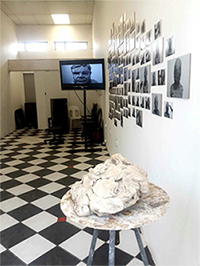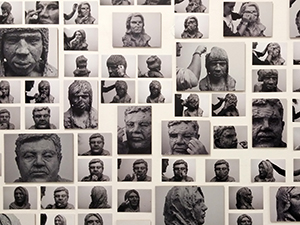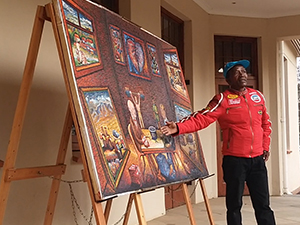Latest News Archive
Please select Category, Year, and then Month to display items
03 January 2020
|
Story Xolisa Mnukwa
|
Photo Supplied
 The UFS Bloemfontein Campus, South Campus, and Qwaqwa Campus choirs are student-centred choirs functioning under the Student Affairs’ Arts, Culture and Dialogue office.
The UFS Bloemfontein Campus, South Campus, and Qwaqwa Campus choirs are student-centred choirs functioning under the Student Affairs’ Arts, Culture and Dialogue office.
It has been a noteworthy year for the University of the Free State (UFS) Choir, establishing itself on the student/university choir scene. The choir, based on the Bloemfontein Campus, represented the UFS at the bi-annual KUESTA choir festival earlier this year, showcasing its musical talent. The choir shared a stage with other university choirs from around the country.
The UFS (Bloemfontein Campus) Choir is a 42-member ensemble of students; the other two choirs, based on the South and Qwaqwa campuses, consist of 40 and 62 members respectively. The choirs are administered and managed by the Division of Student Affairs’ Arts, Culture and Dialogue Office. In addition to Kovsie culture, the choirs strive to have a varied repertoire of inclusive music, with the UFS BFN Campus choir performing a diversity of songs in English, Afrikaans, isiXhosa, and Sesotho.
The new South Campus choir was established in 2018 and is led by choir director, Bonisile Gcisa, who specialises in choral music. This leg of the choir will therefore perform many of his works, but will also include some of the Bloemfontein choir’s set lists, since most of the choir members will be auditioning in 2021 for the Bfn choir when they change campuses.
The Qwaqwa Campus choir will lean more towards a choral genre under the direction of Sipho Khumalo.
The UFS Bloemfontein Campus choir was officially re-established under the leadership of choir conductor Leona Geldenhuys in March 2018, and has performed at several events, including the Rector’s Concert, the annual KUESTA choir convention, and the Bloemfontein Choir invitational. The group has also held a number of public performances on the Thakaneng Bridge at the UFS Bloemfontein Campus.
“Part of the UFS Student Affairs’ objective is to create an inclusive and a socially just student lived experience, and that is the mandate the choirs will also adopt. We hope to create an experience that not only enhances our students’ singing abilities, but also contribute to a more inclusive university experience.” – Angelo Mockie – Director: UFS Student Affairs Arts, Culture and Dialogue office.
“Rest well, be safe, and return rejuvenated,” were his parting words to students for the festive season.
Social cohesion tops the agenda at arts week
2015-08-31

What’s the Difference deur Tanya Britz
Photo: Lelanie de Wet |
Launching the annual Arts 4 Social Justice (A4SJ) week, taking place from 12-19 August 2015 at the Institute for Reconciliation and Social Justice (IRSJ) the Bloemfontein Campus was alive with artworks placed in various buildings and open spaces.
Angelo Mockie said, “This is an opportunity to share knowledge.” Mockie is the coordinator of the annual Arts 4 Social Justice week which gives artists a platform to convey their experiences, and engage students and the public on social issues of national significance.

Meaningful Places deur Adelheid von Maltitz, bygestaan deur Nicolene Jonker en Xoliswa Msimango
Photo: Michelle Nothling |
Coinciding with the week’s events, the IRSJ launched the National Flagship Project in the Visual Arts, funded by the National Arts Council. The theme of the project is ‘Emancipating the African voice in the visual arts for social cohesion purposes’. According to Mockie, “this endeavour is crucial to confronting the histories, policies, and practices that have shaped and constrained the intellectual and social mandates of higher education institutions.”
Adelheid von Maltitz, Klas Thibeletsa, Richard Bollers, and Jaco Spies were some of the artists exhibiting their creative work. A host of students from the university’s Fine Arts Department also presented their works across the campus.
The focus on social justice aims to inspire audiences toward developing engaged citizenship and cohesive communities.

What’s the Difference deur Tanya Britz
Photo: Michelle Nothling | 
History is the Required Process by Motseokae Klas Thibeletsa
|